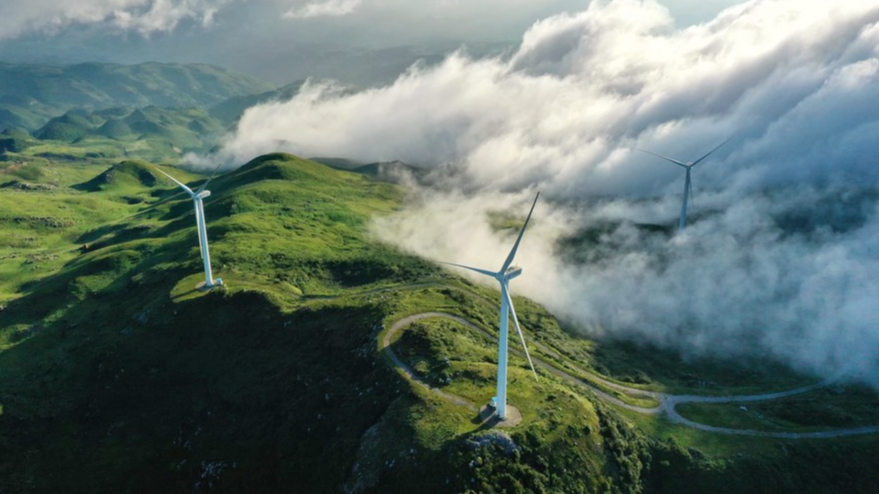Experts expect ministerial-level meeting in Brussels to further boost multilateralism, cooperation

Last year, extensive regions of southern Europe endured prolonged periods of extreme heat, with temperatures soaring to 48 C. In China, a relentless heat wave persisted for 22 days, sweeping across vast swaths of northern China and the Yellow River-Huaihe River area, and setting regional records for the longest hot spell since 1961.
This year, an extraordinary flood besieged the Beijiang River in South China on April 22, two months before deluges of similar intensity usually occur. Meanwhile, meteorologists have issued warnings that Europe, recognized as the world's fastest-warming continent, is bracing for another scorching summer.
In the aftermath of these catastrophic events and in preparation for future challenges, a shared realization has emerged that climate change has no borders.
READ MORE: China, EU hold environment, climate dialogue
The 5th China-European Union High-Level Environment and Climate Dialogue, a vice-prime ministerial-level meeting, is being held this week at the EU's headquarters in Brussels. In exclusive interviews with China Daily, officials and experts expressed great anticipation that the dialogue will further enhance climate cooperation between China and the EU, with both being major global economies and carbon emitters.
On the substantial strides achieved in Sino-EU climate and environment cooperation, they highlighted the immense potential of both sides to spearhead the global transition toward a low-carbon future.
'Ballast' for multilateralism
"Environment and climate have always been a key focus and highlight of China-EU cooperation, being one of the earliest areas included in government collaboration between the two sides and a topic of significant consensus in high-level exchanges between China and the EU," said Zhou Guomei, director-general of the Department of International Cooperation of the Ministry of Ecology and Environment.
In addition to the vice-prime ministerial-level mechanism, which was established in 2020, China and the EU also have separate ministerial dialogues on environmental policy and climate change, she said.
READ MORE: China-EU partnership crucial for green transition
Xia Yingxian, director of the ministry's climate change department, said the China and EU are "ballast" that help stabilize the world's multilateral climate process, especially after the United States announced in 2017 its withdrawal from the landmark Paris Agreement.
Xia Yingxian, director of the Ministry of Ecology and Environment's climate change department, said regardless of how the external environment changes, tackling climate change remains one of the areas of cooperation with the most consensus between the two sides
That year, China, the EU, and Canada collectively launched the Ministerial Meetings on Climate Action, as part of joint efforts to promote exchanges of views on key issues in the multilateral climate process, build momentum and find solutions to advance global climate governance, Xia said.
Held for seven consecutive years, the event sends positive signals in upholding multilateralism, implementing the United Nations Framework Convention on Climate Change and the Paris Agreement, and promoting climate action and international cooperation. "Currently, the geopolitical situation is intricate, and international relations face numerous uncertainties, inevitably impacting the climate multilateral process," he said.
Both China and the EU are significant participants in international climate negotiations. Regardless of how the external environment changes, tackling climate change remains one of the areas of cooperation with the most consensus between the two sides, Xia said.
Dirk Messner, president of the German Environment Agency, also stressed the importance of China and the EU, including Germany, in safeguarding global climate multilateralism.
ALSO READ: China-France energy ties to be upgraded
"We all know that we are living in a world where multilateralism is eroding," he said.
"We talk about climate change. It is about the fragility of the planetary system itself. This is a global problem … and we need to restabilize multilateralism to manage this kind of problems, because we cannot solve them individually as nations."

From a German perspective, Messner said, cooperating with China in the field of climate is absolutely key as the two countries are in the G20, whose members contribute 80 percent of global carbon emissions.
Marco Lambertini, convener of the Nature Positive Initiative, said cooperation between China and the EU is essential, especially against the backdrop of an interconnected world, where impacts on climate and nature transcend borders
"We, as the G20 countries, are producing the problem, which we now have to solve," Messner said.
Marco Lambertini, convener of the Nature Positive Initiative, said cooperation between China and the EU is essential, especially against the backdrop of an interconnected world, where impacts on climate and nature transcend borders.
"Natural ecosystems store immense amounts of carbon and every year, about half of human carbon dioxide emissions are neutralized by forests, wetlands and marine habitats," he said. "Similar to the carbon-neutral transition, it is urgent that we also embrace the nature-positive goal so as to build a sustainable future for all."
ALSO READ: China and Europe discover deeper consensus in helping environment
The EU and China have been aligned in tackling the challenge of building a net-zero emissions and nature-positive world, Lambertini noted.
They have both developed and enacted comprehensive and innovative domestic legislation with similar objectives and connotations, he said. The EU's Natura 2000 protected areas network and China's ecological red lines, for example, both prioritize nature conservation and sustainable development.
Remarkable progress
Hu Jun, director of the Policy Research Center for Environment and Economy affiliated with the Ministry of Ecology and Environment, said China and the EU have carried out pragmatic cooperation in quite a few sectors, including pollution control, biodiversity conservation, carbon trading markets and renewable energy.
To date, over 200 cooperation projects in the environmental and climate sectors have been implemented between China and the EU, as well as its member states such as Germany, France and Italy. Hu cited China-EU cooperation on the environment and green economy project as an example.
Two phases of cooperation have been completed under the project, with the first one spanning 2018 to 2021, and the second 2021 to 2024.
The two sides, for example, have organized seminars on a range of topics, including green transformation, climate transition strategies, biodiversity policy and legislation, Hu said. Research on innovative green finance policies, which "have provided crucial decision-making support for policymakers", has also been undertaken.
Messner underscored the importance of the two communication channels, which feature experts interacting with political decision-makers, and help the two sides understand and learn from each other
Joint research has been conducted on synergizing pollution control and carbon-emissions reduction in the transportation sector as well as the role of green finance in supporting emission reductions, offering robust support for China's environmental protection efforts, Hu said.
READ MORE: Green technologies and economy thrive on competition, not tariffs
Messner said Germany and China have had active interaction on climate and energy, much of which has happened via the China Council for International Cooperation on Environment and Development. Established in 1992, the council is a high-level, international think tank that reports to the Chinese government. It is currently chaired by Chinese Vice-Premier Ding Xuexiang.
"As a member of the council, I'm also chair of a task force which is working on digitalization and artificial intelligence for sustainability goals," Messner said. "We published the first study on this issue last year, and we are preparing a second one on smart and sustainable cities in Europe and China at the end of the year."
Messner underscored the importance of the two communication channels, which feature experts interacting with political decision-makers, and help the two sides understand and learn from each other.

Working together
Tian Chengchuan, director of the Ministry of Ecology and Environment's Foreign Environmental Cooperation Center, highlighted a range of collaborative projects between Chinese and European companies aimed at advancing green and low-carbon development.
An intelligent water supply management system developed by the Shanghai Pudong Veolia Water Corporation Ltd, a subsidiary of French environmental solutions provider Veolia Group, for example, is projected to significantly reduce carbon emissions associated with water supplies for 3.8 million users in Pudong, Shanghai, over a 10-year period from its launch in 2019, he said.
ALSO READ: China, EU, Singapore in multilateral green capital push
The system is expected to help reduce carbon emissions by almost 4,758 million metric tons annually, Tian said.
With an independently developed cooling technology, China's Lenovo Group Ltd now helps remove approximately 90 percent of the heat generated by the computing systems at the Leibniz Supercomputing Center in Germany, he said, adding the technology has increased cooling efficiency 4,000 fold.
Hot water generated in the cooling process is used to provide heating for buildings in the center complex, resulting in annual savings of $1.25 million, he said.
The network aims to facilitate the sharing of best practices and technological solutions in promoting green and low-carbon transformations, enhance the understanding of green transformation policies in China and Europe within the business community...
In a move to further ramp up cooperation between Chinese and European companies, Tian said his center is making efforts to establish a China-Europe environmental and climate cooperation network involving various stakeholders such as think tanks, businesses and regional authorities.
The network aims to facilitate the sharing of best practices and technological solutions in promoting green and low-carbon transformations, enhance the understanding of green transformation policies in China and Europe within the business community, and support Chinese and European enterprises in engaging in collaborative exchanges related to green transformations, he said.
Hu, from the Policy Research Center for Environment and Economy, said China and the EU will also strive to deepen regional-level cooperation.
READ MORE: Protectionism will drive green transition to dead end
Initial focus will be on promoting the establishment of a China-Europe regional green and low-carbon cooperation platform, he said.
He outlined a long list of sectors with potential for China and the EU to further enhance cooperation through joint programs and policy dialogue, as well as seminars and training on issues such as clean energy, green transportation, green buildings, and the circular economy.
He said there was significant potential for the two sides to promote climate cooperation programs in third-party regions, including Southeast Asia and Africa.
The two sides can provide training, organize seminars and carry out demonstration projects in these regions under the frameworks of South-South climate cooperation and the green Belt and Road Initiative, he said.
"Overall, there are bright prospects and immense opportunities for pragmatic cooperation between China and the EU," he said.


